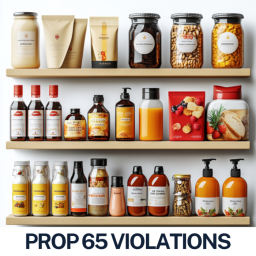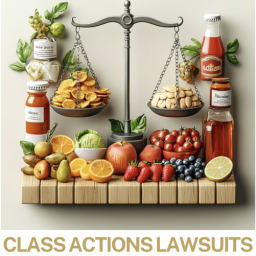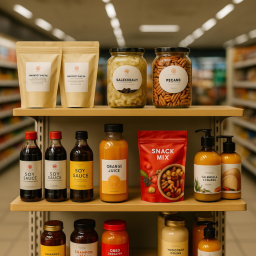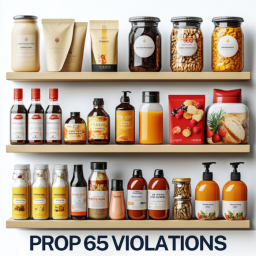
Since late 2024, Proposition 65 enforcement over Bisphenol S (BPS) in receipts has surged, with notices now targeting over 260 companies across industries. For franchise systems, the risks are compounded: franchisors may be liable if they dictate suppliers or standards that involve BPS, while franchisees face direct exposure for every non-compliant receipt handed to customers. This dual-liability crisis demands immediate action.
What is BPS and why is it a Prop 65 issue for franchises?
BPS (Bisphenol S) is a chemical developer commonly used in thermal receipt paper. Like BPA, it disrupts hormones and has been linked to reproductive harm. Since BPS was officially listed under Proposition 65 in 2023, businesses in California must provide warnings if their products expose customers to it.
For franchises, the problem is systemic: one supply-chain decision can expose both franchisors and hundreds of franchisee locations to simultaneous liability.
How has BPS enforcement evolved?
The pace of Prop 65 enforcement around BPS has been rapid:
- December 29, 2024: BPS listing under Prop 65 took effect, triggering new warning requirements.
- Early 2025 (Jan–Apr): Initial 60-day notices targeted paper manufacturers and large retailers, forcing recalls and vendor reviews.
- May 2025: The Center for Environmental Health (CEH) released testing results showing a single receipt touched for 10 seconds could exceed safe-harbor levels. Media coverage amplified public awareness.
- July 2025: CEH consolidated actions, filing lawsuits naming more than 50 corporate defendants in one complaint — including multiple franchisors.
- August 2025: Enforcement expanded to ancillary materials like UPC stickers and thermal labels, broadening the reach of regulated products.
- Fall 2025: The number of targeted companies surged to over 260, spanning retail, restaurants, finance, and service sectors. This broader enforcement landscape is covered in detail in our overview of Prop 65 receipt lawsuits affecting 260+ companies.
Why are franchisors especially vulnerable?
Franchisors often control key aspects of operations, including approved suppliers, equipment standards, and receipt-paper specifications. This control creates potential liability if the mandated materials contain BPS.
Courts have found franchisors liable under theories of negligence or vicarious liability when they exercise substantial operational control. In practice, that means:
- If a franchisor requires franchisees to buy from a designated paper supplier, the franchisor could share liability for Prop 65 violations.
- Enforcement actions may target the corporate franchisor, not just individual operators, magnifying exposure.
How are franchisees at risk?
Franchisees, as local business operators, face direct Prop 65 enforcement. Each transaction slip handed to a consumer without a proper warning can be considered a separate violation. With penalties of up to $2,500 per violation per day, liability can add up quickly across high-volume stores.
Recent notices of violation have already named both major franchisors (McDonald’s, Domino’s, Taco Bell, Burger King, Subway) and specific California franchisee locations, such as Pizza Hut, KFC, and IHOP stores.
Which franchises have already been named?
Notices have reached nearly every major segment of the franchise industry:
- Quick service restaurants: McDonald’s, Domino’s, Pizza Hut, Burger King, Subway, Taco Bell, KFC, Papa John’s, Little Caesars
- Casual dining: Olive Garden, Red Lobster, The Cheesecake Factory, Red Robin, IHOP, Denny’s
- Coffee & specialty chains: Dunkin’, Dutch Bros, Peet’s Coffee, Cinnabon, Crumbl, Shake Shack, The Habit Burger
Both franchisors and individual California franchisee locations have been named directly, a warning that local operators cannot rely on franchisors to absorb all responsibility.
The following companies known to operate as franchisors have received a Notice of Violation for BPS Receipt Paper:
Explicitly listed as franchisors
- Qdoba (Rest. & Franchisor) (L) – Qdoba Mexican Eats
- Teaspoon Franchising – Teaspoon (boba tea brand)
- KF Tea Franchising (& USA) – Kung Fu Tea
- Pinkberry (Kahala Franchising) – Pinkberry frozen yogurt (Kahala also owns other brands)
- Franchise World Hdq. – Subway (Subway’s corporate franchisor entity)
- Cinnabon / Franchiser – Cinnabon
Additional companies in the list that are known franchisors
- Dunkin’ Brands / Dunkin’ – Dunkin’ Donuts, Baskin Robbins
- Krispy Kreme – Krispy Kreme Doughnuts
- Jersey Mike’s – Jersey Mike’s Subs
- Everbowl – Everbowl acai/smoothie shops
- Panda Restaurant Group – Panda Express
- Nekter Juice Bar – Nekter Juice Bar
- Jamba Juice – Jamba
- Dave’s Hot Chicken – Dave’s Hot Chicken
- Checkers Drive-In Restaurants – Checkers/Rally’s
- Einstein & Noah Corp. – Einstein Bros. Bagels
- RARE Hospitality – LongHorn Steakhouse, The Capital Grille (subsidiary of Darden)
- Cracker Barrel – Cracker Barrel Old Country Store
- Golden Corral – Golden Corral
- Arby’s Restaurant Group – Arby’s
- BJ’s Restaurant – BJ’s Brewhouse
- Applebee’s Restaurants / Dine Brands – Applebee’s, IHOP
- The Habit Restaurants – The Habit Burger Grill (Yum! Brands)
- Pizza Hut (Steptoe) – Pizza Hut (Yum! Brands)
- Domino’s Pizza – Domino’s
- Denny’s – Denny’s
- Little Caesar’s – Little Caesars
- Carl’s Jr. / CKE Restaurant Supply – Carl’s Jr., Hardee’s (CKE Restaurants)
- Sonic Industries KFC – Sonic Drive-In (Inspire Brands), KFC (Yum! Brands)
- Five Guys – Five Guys Burgers & Fries
- Papa John’s – Papa John’s
- Papa Murphy’s – Papa Murphy’s Take ’N’ Bake Pizza
- Brinker Restaurant Corp. – Chili’s, Maggiano’s
- MOD Super Fast Pizza – MOD Pizza
- Burger King (Venable) – Burger King (Restaurant Brands International)
- Jack in the Box – Jack in the Box
- Del Taco – Del Taco
- McDonald’s – McDonald’s
- Taco Bell (Corp. & America) – Taco Bell (Yum! Brands)
- Wetzel’s Pretzels – Wetzel’s Pretzels
- Yard House – Yard House (part of Darden Restaurants)
Best practices for franchise compliance
For Franchisors
- Supply-chain audit: Review approved suppliers for BPS content and shift toward BPS-free vendors.
- Franchise agreement updates: Clarify sourcing obligations and limit franchisor liability where possible.
- System-wide compliance programs: Provide standardized Prop 65 training, signage, and compliance protocols.
For Franchisees
- Vendor verification: Request supplier certifications or conduct independent testing.
- Warning deployment: Post Prop 65 signage at point of sale if receipts remain non-compliant.
- Recordkeeping: Keep documentation of supplier certifications and compliance efforts.
- Legal consultation: Engage counsel early to ensure notices can be defended or resolved efficiently.
FAQs
Can franchisors shift liability entirely to franchisees?
Not completely. Even with disclaimers, franchisors exercising substantial operational control may still face liability.
How can franchisees protect themselves if franchisors control suppliers?
Franchisees should push franchisors to provide certified BPS-free vendors and document concerns in writing to mitigate exposure.
What is the safest long-term compliance strategy?
Transitioning to phenol-free thermal paper eliminates the chemical risk and avoids the cost of ongoing Prop 65 warnings.
Final Takeaway
Prop 65 enforcement over BPS in receipts has escalated rapidly since late 2024, with over 260 companies now facing notices. For franchise systems, this means both franchisors and franchisees are in the crosshairs. Supply-chain audits, agreement updates, and proactive compliance programs are critical to avoid costly litigation and reputational damage.
Juris Law Group helps franchisors and franchisees navigate this evolving risk landscape with tailored compliance programs and defense strategies that safeguard both brand and business.












